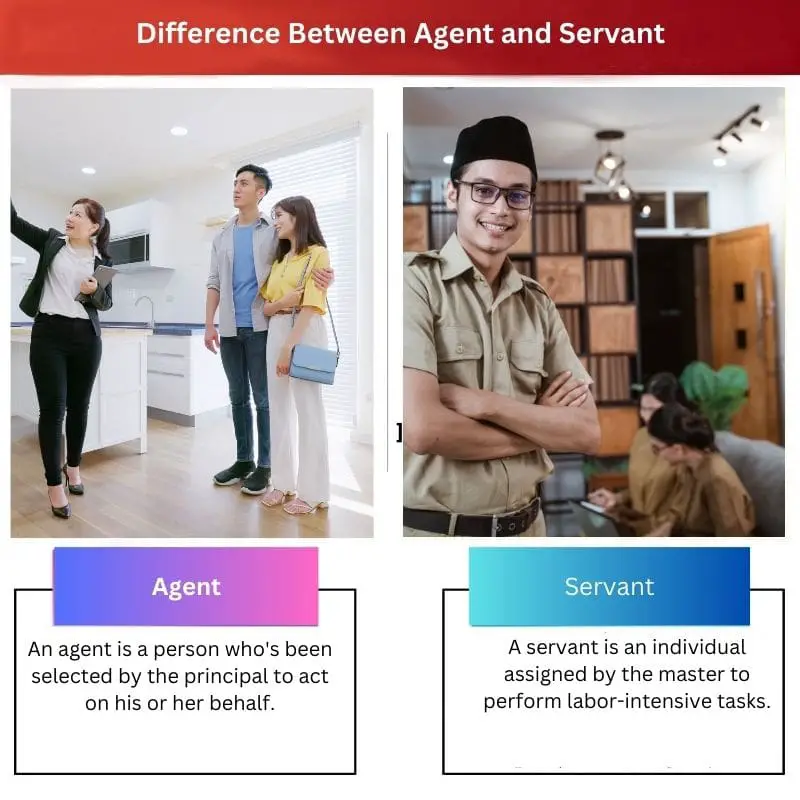A person can’t conduct every business deal alone. Caused by lack of time and the complexity of their operation, they need assistance.
In these circumstances, people use a third party to carry out their tasks on their behalf. These people are Agents. The agency contract is the legal arrangement between the principal and the agent.
Agent and Servant are frequently used interchangeably. One who serves others is a servant. Servants do housekeeping, laundry, dishwashing, table arranging, and other jobs. But an agent is more for business needs or business-related tasks.
Key Takeaways
- An agent acts on behalf of a principal to create legal relations with third parties, while a master employs a servant to perform tasks under their control.
- Agents have a fiduciary duty to their principal, whereas servants owe a duty of care to their master.
- The principal is responsible for the actions of an agent, but the master is liable for the actions of a servant.

Agent vs Servant
An agent is an individual who works on a commission basis under a master or a Principal. He/ She can work under various principals simultaneously, unlike a servant who works under the supervision of a Master on daily wages or salary. A supervisor directs a servant on what to do and how to do a task.
Comparison Table
| Parameters of Comparison | Agent | Servant |
|---|---|---|
| Definition | An agent is a person who’s been selected by the principal to act on his or her behalf. | A servant is an individual assigned by the master to perform labor-intensive tasks. |
| Obligations | The principal has the right to specify what work has to be done even though an agent is not directly under his or her direct supervision. | A servant is obligated to carry out the master’s instructions only. |
| Payment | Commissions are paid based on the tasks the agent has completed. Most likely to have an agreement or contract before starting the job or task about the payments too. | Based on the servant’s work performance, wages or salaries are paid. |
| Duty Assignments | An agent can never act as a servant. | Sometimes, an agent’s tasks may be reassigned to a servant. |
| Range of Masters | An agent may represent several principals. An advocate, for instance, presents cases in court on behalf of his clients. | A servant works only for one master. |
Who is an Agent?
When the principal appoints someone to operate on his or her behalf, a principal-agent relationship is established.
Such an agent who creates a legally binding connection between the primary and the third party may be a person, such as an employee or partner, or a business, such as an outsourcing company or accounting firm.
In general, delegation and authorization should be formalized in the form of a contract that specifies the usual task methods and working style. This is known as a principal-agent relationship. The authorization can, however, be given orally or implicitly and does not need to be written.
The contract is when a principal and agent relationship is born. Therefore, to establish a principal-agent relationship, the parties must have the capacity to engage in a contract. Additional necessities include the following:
- Appointment of a person as an agent by the principal, either explicitly or implicitly.
- An agent is responsible for carrying out the tasks according to the principal’s instructions.
- The entitlement to compensation for an agent.
- The power granted to the agent by the principal to rescind it.

Who is a Servant?
The old term “servant” is used to define a worker who is not an independent contractor and who, in exchange for payment, works under the supervision and direction of another person known as the “master.
The servant-master relationship develops as a result of an express contract whereby a person agrees to carry out tasks for and under the master’s direction.
The parties’ agreed-upon, clear, and conclusive terms and conditions shall be included in the contract.
Due to the fact that an employment contract is a binding legal document, failing to fulfil one’s obligation leads to owing compensation to the party who was wronged because it marks a breach of the contract.
The consent of both parties is sufficient to create a master-servant relationship even in the absence of a contract. So in some cases, an employment contract is not required to be written.
It is nonetheless required for reasons of enforceability and certainty, whether it be an appointment letter or a formal employment contract with terms and conditions.
It is important to note that the description of the master-servant relationship is sometimes tied directly to the concept of at-will employment, which gives employees the right to end their employment at any time and without cause.

Main Differences Between Agent and Servant
- A person who is employed by the principal and given the authority to act on his behalf is known as an agent. Moreover, he or she has the authority to bind the principal and a third party to a contract.
- A servant, on the other hand, is not similar in character. This is because a servant cannot sign contracts on his master’s behalf.
- An agent does not carry out their duties directly under the direction and control of the principal. However, a servant must function under the master’s strict direction and control.
- An agent may work for several principals all at once. A servant, conversely, can only serve one master at a time.
- An agent receives instructions from the principal on what to do. In contrast, the master must explain to the servant both what needs to be done and how it should be done.
- The agent receives commissions from the principal. In contrast, the servant is compensated by the master through salary or wages.

- https://heinonline.org/HOL/LandingPage?handle=hein.journals/clt5&div=25&id=&page=
- https://heinonline.org/HOL/LandingPage?handle=hein.journals/amlr35&div=7&id=&page=
